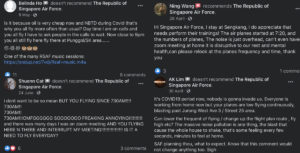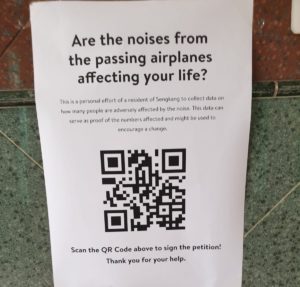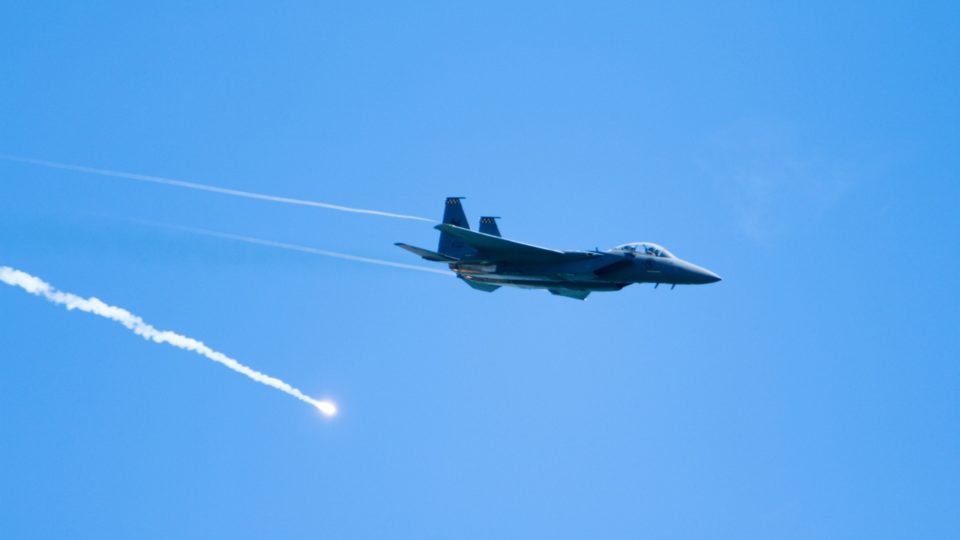Living beneath the highway to the danger zone was not something Geraldine Fok expected to deal with when she moved into Sengkang’s Fernvale Link neighborhood.
Nearly each day, F-15s and F-16s circle morning to night over the high-rise residential block. Just yesterday, the 27-year-old human resource manager counted 30 flyovers alone, starting from 9am.
She is among thousands living in Singapore’s northeast who have struggled with the noise ever since the pandemic turned homes into workplaces, where the roar of dual, 25,000-pound-thrust Pratt & Whitney engines disrupt online meetings and presentations.
“My family moved to Sengkang just over 3 years ago and hearing the planes fly by was exciting for about a day, but then it got annoying pretty quickly,” she told Coconuts Singapore this week. “Every time we hear the roaring of the jets above us, we get excited for National Day, but National Day isn’t every day.”
Fok, who lives with her family of four, logged Wednesday’s flights in a spreadsheet she shared with Coconuts Singapore. The 32 flights heard between 9am and 8pm average to 2.5 per hour, though they come intermittently – and most frequently from 2pm to 3pm.
The flights usually become more common in August ahead of independence day, when the annual festivities are rehearsed. The crowd-pleasing military display is a signature part of the celebration. But those living within a 10-kilometer radius of the Paya Lebar Air Base say it can be a living hell.
University lecturer Adrian Koh, who has lived on Punggol Drive for five years, has attempted to measure the jet engine noise using a meter app on his phone. He said it has measured levels from 80 decibels to 90 decibels.
Noise over 70 decibels over a prolonged period can begin to damage hearing. Damage is possible after two hours of exposure to 80-decibel noise.
According to the Purdue University in the U.S., that is comparable to standing 15m from a freight train or standing a few meters from a moving motorcycle. Sounds measuring around 150dB can rupture the eardrum.
He wonders how much louder it would be if they passed directly overhead rather than at a distance.
There First
The 800-hectare airbase was built in 1954 and used to be Singapore’s international airport before it was repurposed by the military in 1967. Complaints about the noise began at least three years ago as housing developments, mainly Sengkang, Punggol, and Hougang, spread across Singapore’s northeast and encroached on the base. The government has responded to complaints by moving half of its training flights abroad or over the waves. It’s also promised to relocate the base – in 2030. That also means those suffering from the noise pollution just have to endure another decade, at least.
Complaints have filtered up, and the Republic of Singapore Air Force, or RSAF, recently adjusted flight schedules to give more quiet time for students preparing for examinations coming in a few weeks. Despite that, complaints from hundreds of residents continue to fill RSAF’s Facebook page. Nearly 600,000 residents call the three neighborhoods home, according to latest figures by the Housing Development Board, excluding those on private property.
A petition launched last month has drawn only 400-plus signatures in three weeks. Petition author Kelly Lim said she can hear fighter jets flying up to seven times an hour from as early as 7:15am.

In response to queries, the Ministry of Defense said yesterday that air training was necessary to keep its pilots ever ready to guard Singapore. But it also noted the measures taken to cut down on noise, including reducing flight routes and the number of aircraft.
“The Republic of Singapore Air Force (RSAF) needs to continue flying in local airspace to keep our pilots proficient and maintain operational readiness in order to safeguard Singapore’s skies. While a significant proportion of RSAF flying training is conducted with simulators and overseas, local flying training is still necessary,” its statement read.
“To mitigate the impact of aircraft noise to the public, the RSAF conducts most of the local flying over waters rather than over land. It has also reduced flight routes over populated areas where possible and minimised the number of aircraft per flying window,” it added.

‘Irritating’
Bank executive Stanley Tan, 40, noticed more aircraft noise from his home on Buangkok Drive after Singapore began to relax outbreak containment measures in June. He finds it particularly “irritating” that he has to frequently mute his microphone during virtual meetings while working from home, and said that his son is also struggling to study for his major primary school leaving examinations.
“Flying pas[t] with their roaring sound is already very noisy. Some pilot still full blast. The sound [is] very unbearable,” Tan, an area resident of five years, told Coconuts Singapore. “I don’t understand why can’t [the aircraft] fly left along the [coastal] area instead of flying over the residential area? What if, I say what if … there is a technical failure? Will the jet come crashing on a HDB block?”
The noise is also interrupting his son’s lessons, meaning, “the teacher will pause and or have to repeat again after the jet fl[ies] off,” Tan said.
A video he took yesterday showed at least five fighter jets screaming by his housing estate at around 1pm.
Koh, the university teacher, described the RSAF’s decision to adjust the flights for students as a “token action.” He thinks the military should just “stop flying altogether” during the school exam period. He also thinks residents’ frustrations stem from a lack of clarity from the government.
“The period leading up to the exams is very crucial. [In my opinion], they should stop flying altogether during the exam period. But without clear information on their need to fly, I could be accused of undermining their efforts for national defense. I’m always asking, ‘How much is too much?’” the 45-year-old instructor said.
Koh said that he hears jets fly every hour of every day from 8am to 9pm. Due to the noise, he has had to re-record his online lessons multiple times or pause lessons until the noise fades, affecting his students’ learning. He also suggested the air force publicize flight schedules so residents can plan around them.
“The key issue that I have is, as affected residents, the RSAF should lay out a schedule of their flight times and have the residents informed. This is so that we could plan our activities around their flights, and not to be ambushed by loud jet noises throughout the course of the day, especially when we are WFH,” Koh said.
“We just hope to have more clarity, predictability and accountability on the frequency of their flights,” he added.
Other stories:
Sex-positive NUS group cancels ‘BDSM workshop’ after participants doxxed
Open wide: Fatburger fans gets third outlet at Newest Mall
2020 Hindsight: PM Lee gives mixed marks to Singapore’s COVID response
NUS China scholar accused of sexual misconduct resigns



